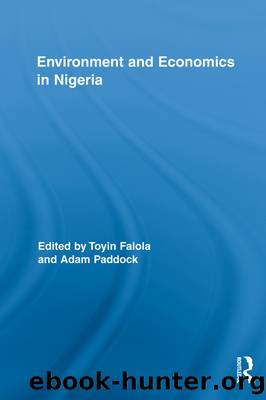Environment and Economics in Nigeria by Toyin Falola Adam Paddock

Author:Toyin Falola, Adam Paddock [Toyin Falola, Adam Paddock]
Language: eng
Format: epub
ISBN: 9780415847421
Barnesnoble:
Publisher: Taylor & Francis
Published: 2013-10-14T00:00:00+00:00
What is to be done?
In line with the theoretical underpinnings of liberalism espoused in the second section of this chapter, John Locke, one of the social contract theorists, âcategorically asserted that the government (acting on behalf of the state) could be altered, amended, changed or dissolved legitimatelyâ in the event of any of the following situations:
Whenever such a prince or single person established his own arbitrary will in place of the law; when the prince hindered the legislature from assembling in its due time or from acting freely, pursuant to those ends for which it was constituted; when by the arbitrary power of the prince, the elections and the ways of elections were altered without the consent, and contrary to the common interest of the people; the delivery of the people into the subjection of foreign power, either by the Prince or by the legislature; the person who had the supreme executive power neglect[s] laws already enacted and could not be executed.37
From the foregoing analysis, the Nigerian state has violated all of the conditions listed above. Thus, in line with this logic, coupled with the abundant evidence that the Nigerian state has consistently subverted the very essence and raison dâetre of a state, the state needs to be renegotiated. This has become more compelling than ever because the Nigerian state in its present form is weak, dependent, predatory, parasitic, inefficient and irresponsible. It is in this connection that we join the call for the convocation of a Sovereign National Conference (SNC) of all ethic nationalities within the Nigerian federation to deliberate on all national questions for the purpose of shedding the state of its colonial vestiges and its illiberal characteristics. This is the irreducible minimum condition to redress not only the injustices in the Niger Delta but the overall developmental challenges afflicting Nigeria.
Further, as part of negotiations at the proposed conference, resource control, political inclusion by, as well as the principle of self-determination must form the bedrock of negotiations. It is believed that it goes without saying that the decisions reached at this âSovereignâ dialogue should not be subjected to any tinkering either during the conference or after it, as has been the practice in the past by the few ruling elites and predators who continued to hold the state at its jugular. When this is done, it would then pave the way for the success of all other measures that would âhalt the environmental degradation which oil exploration has foisted on the (region) ⦠and return the Niger Delta to sound ecological health so that it continues to provide sustenance to present and coming generations.â38
It is also expected that the outcome of the Sovereign Conference would guarantee the autonomy of the state through popular democratic empowerment, in which case the peoplesâ vote would count. The current charade called democratization, driven by the logic of liberal democracy where people vote without choosing, must give way to a truly participatory electoral process where the people can freely elect those who would run the affairs of state and take decisions on their behalf.
Download
This site does not store any files on its server. We only index and link to content provided by other sites. Please contact the content providers to delete copyright contents if any and email us, we'll remove relevant links or contents immediately.
Man-made Catastrophes and Risk Information Concealment by Dmitry Chernov & Didier Sornette(4731)
The Revenge of Geography: What the Map Tells Us About Coming Conflicts and the Battle Against Fate by Kaplan Robert D(3596)
Zero Waste Home by Bea Johnson(3286)
COSMOS by Carl Sagan(2944)
In a Sunburned Country by Bill Bryson(2941)
Good by S. Walden(2910)
The Fate of Rome: Climate, Disease, and the End of an Empire (The Princeton History of the Ancient World) by Kyle Harper(2431)
Camino Island by John Grisham(2379)
A Wilder Time by William E. Glassley(2358)
Organic Mushroom Farming and Mycoremediation by Tradd Cotter(2304)
Human Dynamics Research in Smart and Connected Communities by Shih-Lung Shaw & Daniel Sui(2175)
The Ogre by Doug Scott(2105)
Energy Myths and Realities by Vaclav Smil(2054)
The Traveler's Gift by Andy Andrews(2008)
Inside the Middle East by Avi Melamed(1937)
Birds of New Guinea by Pratt Thane K.; Beehler Bruce M.; Anderton John C(1905)
Ultimate Navigation Manual by Lyle Brotherton(1764)
A History of Warfare by John Keegan(1712)
And the Band Played On by Randy Shilts(1612)
